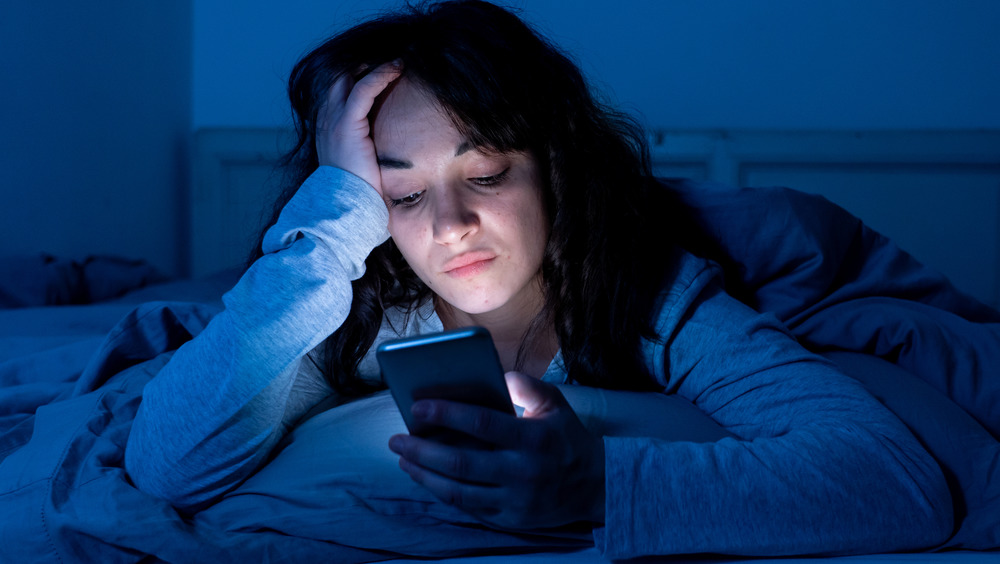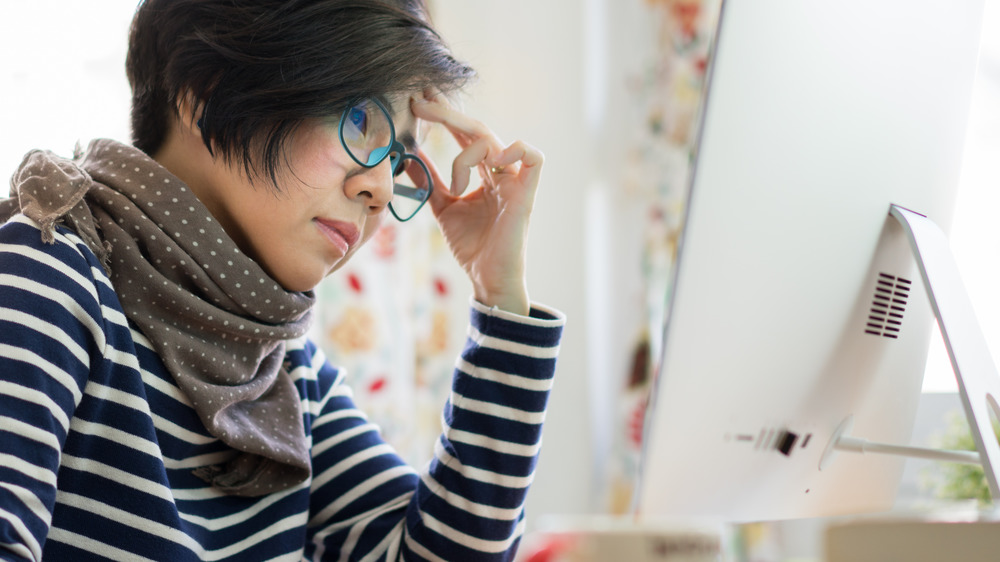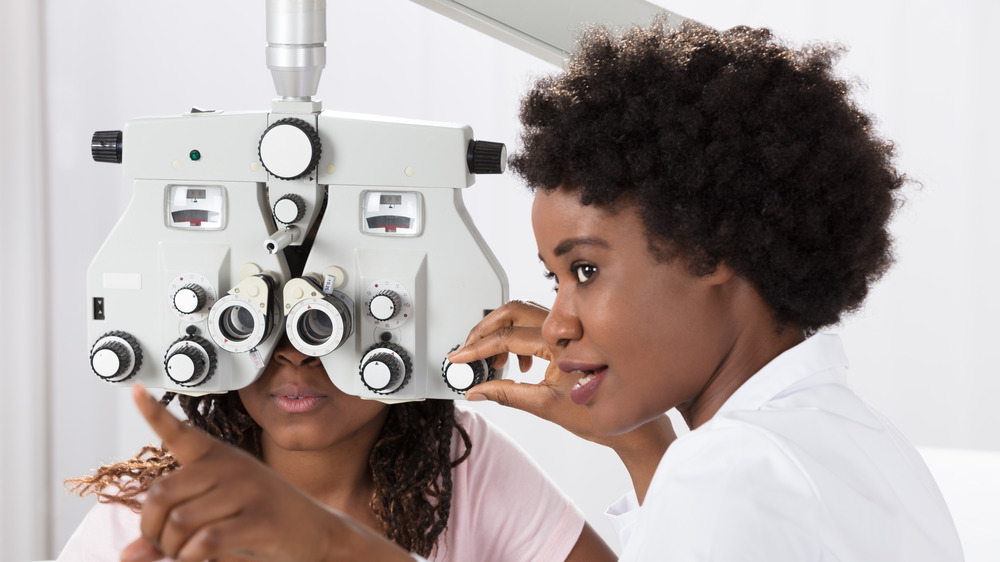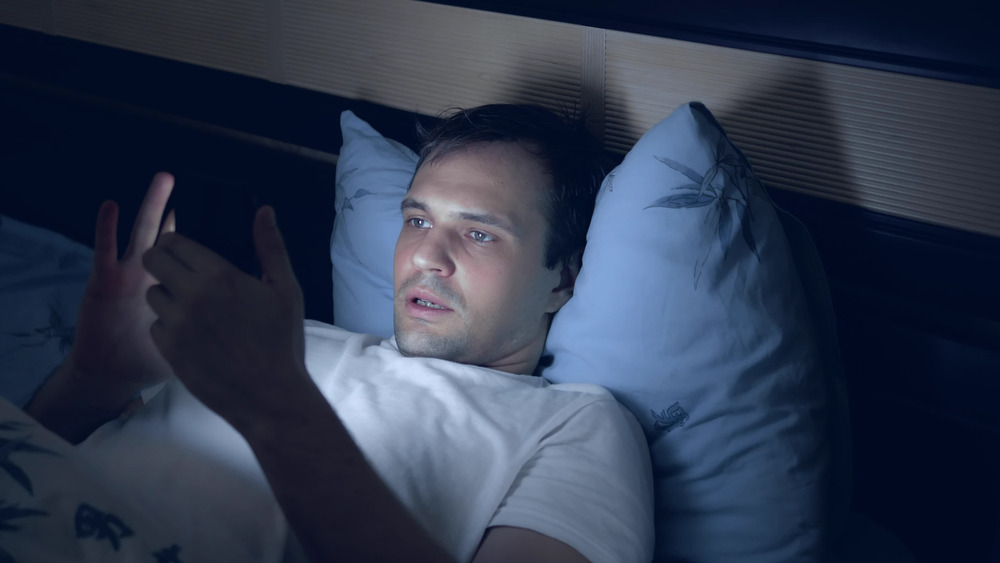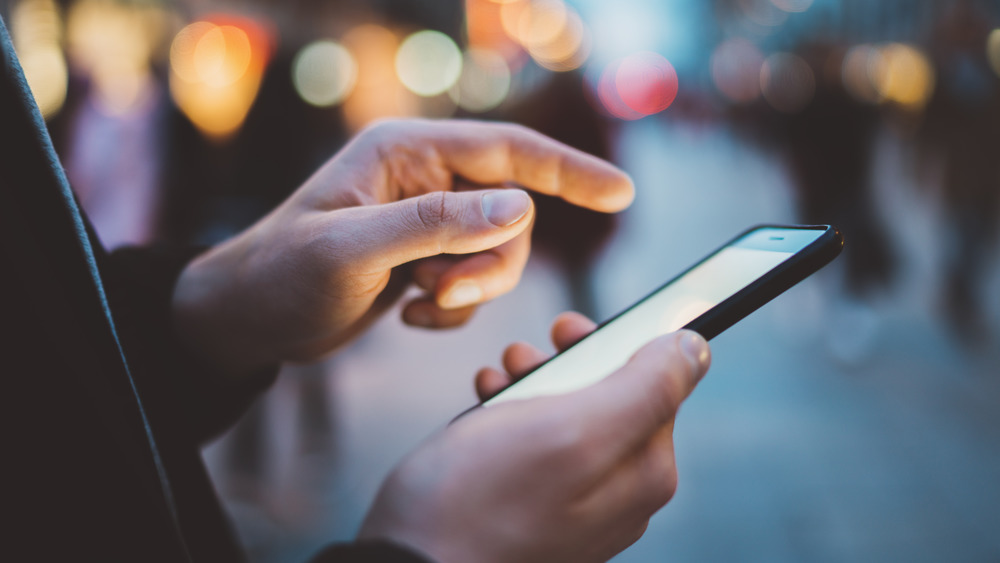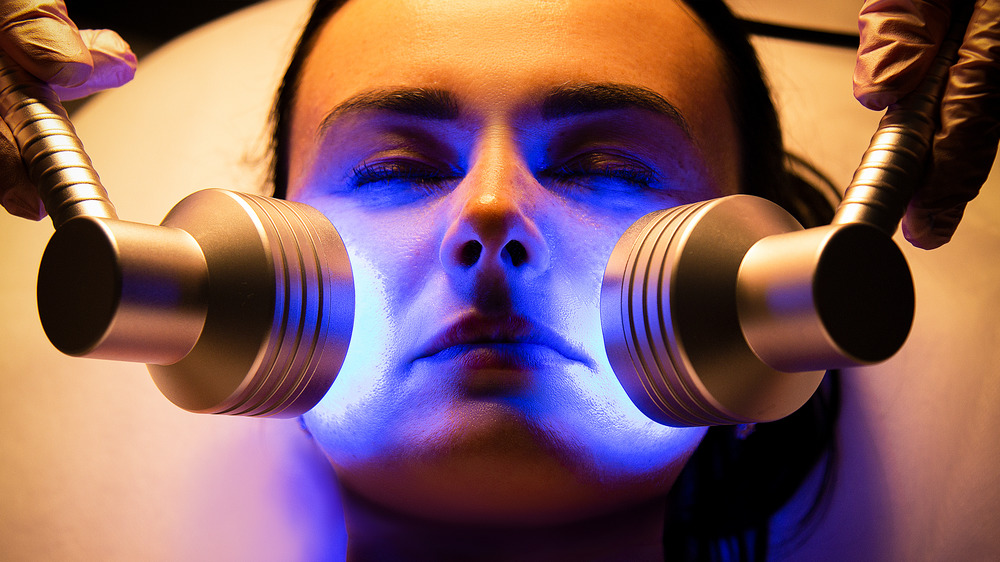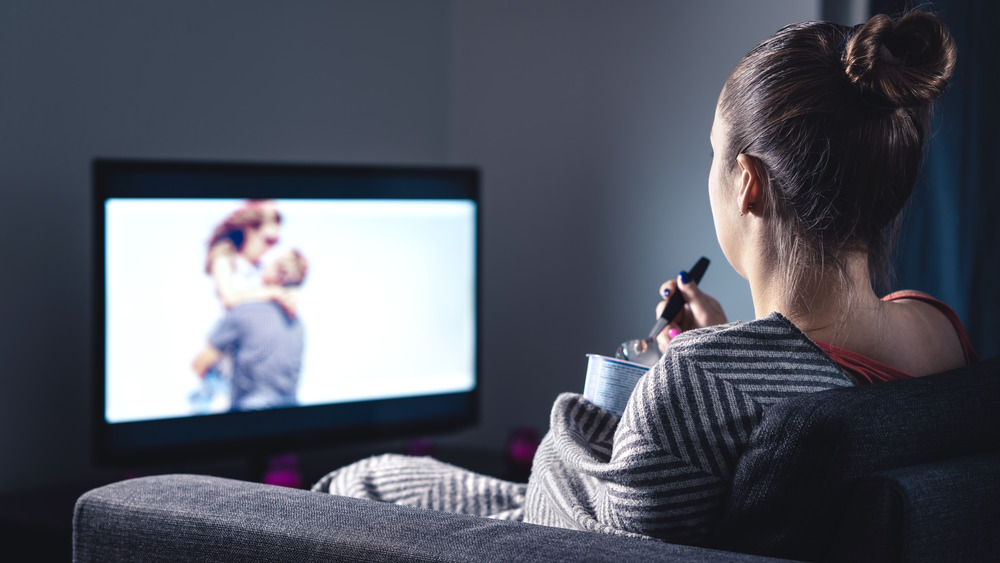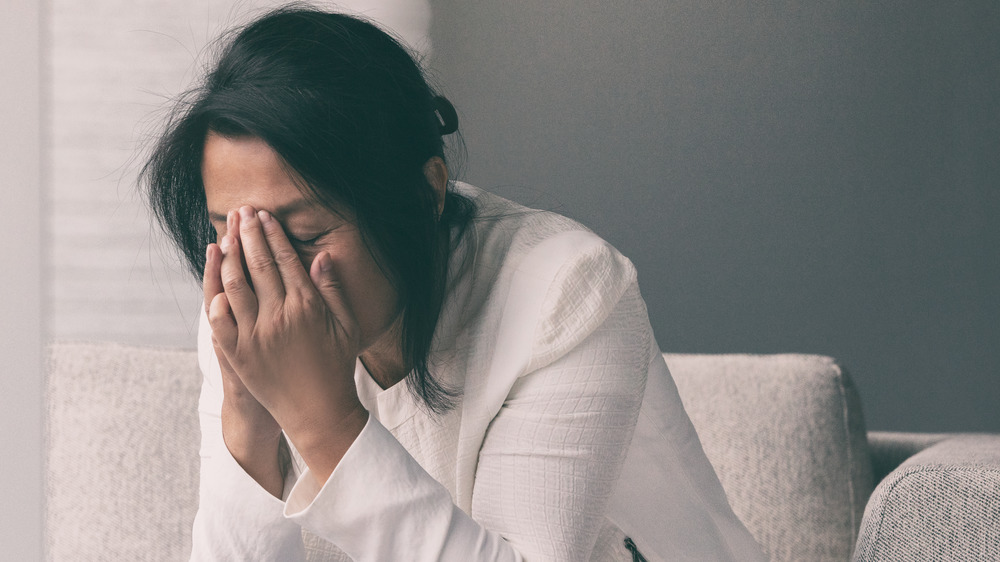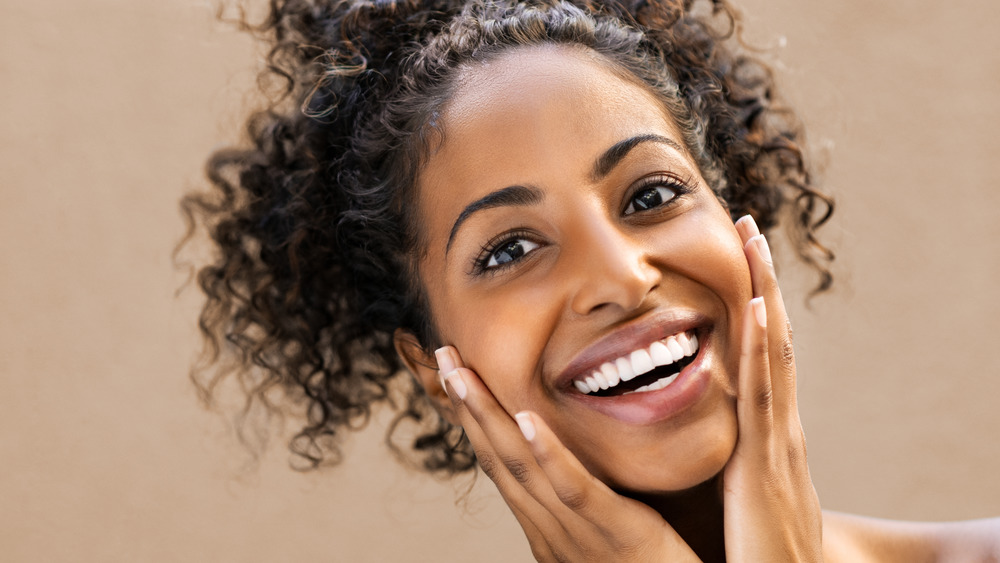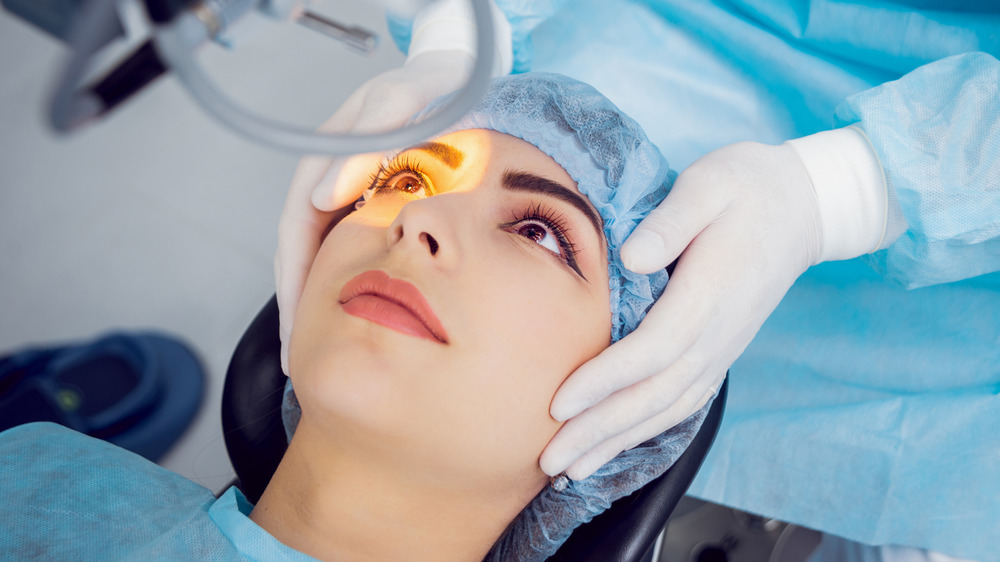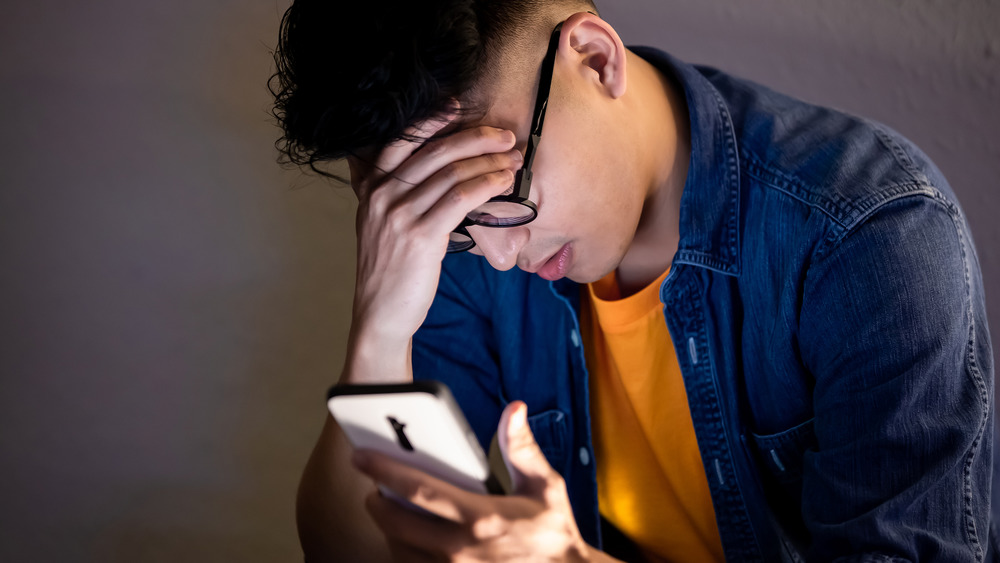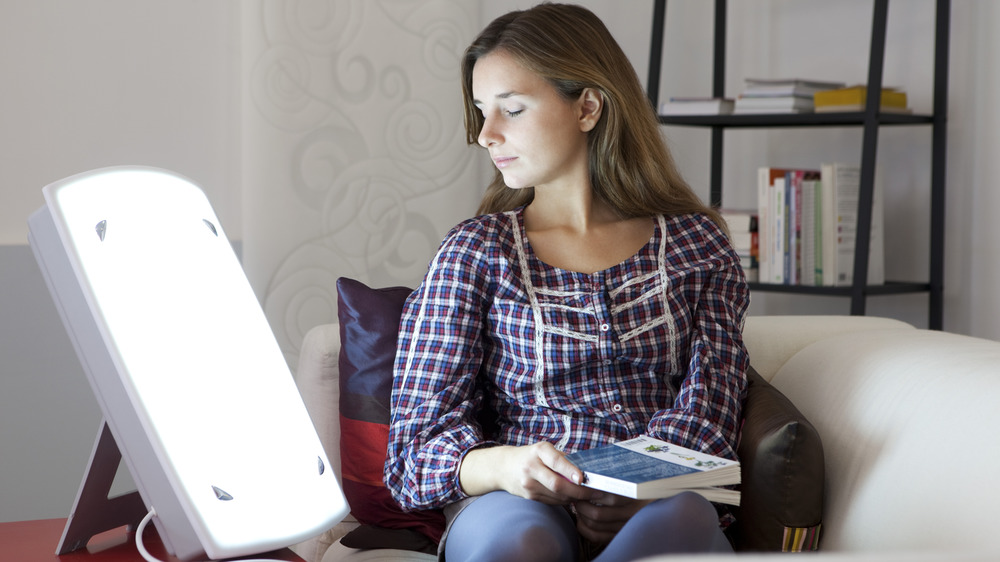Sneaky Ways Blue Light Does Damage To Your Health
Blue light is inescapable and, according to WebMD, sunlight is the main source. When you are outdoors, you get the most exposure to blue light. But there are also many man-made, indoor sources of blue light, including TVs, smartphones, gaming systems, fluorescent and LED light bulbs, and computer monitors. However, the amount of blue light emitted by these electronic devices is only a small fraction of what the sun emits. Unfortunately, people spend a lot of time on these devices, and they do so in close proximity.
This concerns healthcare professionals and eye doctors due to the long-term effects of blue light. Yes, too much light might harm you, especially when these devices are used at night (via WebMD). However, blue light is all bad for you; there is some evidence that supports the use of this light. It has even been used to treat many types of ailments. Keep reading to learn about the effects of blue on your health and potential benefits of blue light.
Your eyes are not very good at blocking blue light
The front part of your eye — the cornea and lens — is really good at blocking the sun's UV rays and keeping them from reaching the light-sensitive parts of your eye, such as the retina (via VisionMakers). However, they are not nearly as good at blocking out blue light, this according to the American Optometric Association. And these days, it can be difficult to escape computers, phones, and other blue light-emitting devices.
According to the Cleveland Clinic, blue light-blocking glasses could be helpful for mitigating the effects of blue light on the eyes, as they can reduce glare and potentially reduce retina damage from exposure to blue light. But according to ophthalmologist Dr. Rishi Singh, there isn't enough evidence confirming that blue light-blocking lenses actually help. "Unfortunately, there hasn't been a lot of research done with blue light blocking glasses," explained Dr. Singh. "And of those studies that have been done, they've been too small and it's not the same thing we'd see in clinical practice."
Blue light may lead to nearsightedness
There is some evidence suggesting the short wavelengths from blue light can cause and worsen visual fatigue and myopia (nearsightedness), the International Journal of Ophthalmology detailed. And spending too much time indoors certainly doesn't help. A 2017 study found that not getting enough sunlight can contribute to nearsightedness in teens and young adults.
As nearsightedness typically begins in childhood, it is important for parents to monitor children's blue light exposure by reducing the amount of this light given off by electronic devices. Blue light filters are available to cover a laptop or tablet screen, or as part of a smart device's settings, to reduce the amount of blue light someone is being exposed to. It is also a good idea to switch off devices long before bedtime.
More research is needed to understand the full effects of blue light on vision and how to best manage use of blue light devices. For the time being, the best message is that less is best when it comes to screen time.
Blue light might increase the risk of macular degeneration
There is some evidence suggesting blue light may be a risk factor for the onset or progression of macular degeneration, an eye disease affecting the small central part of the eye called the macula, an article published in Scientific Reports explained. Macular degeneration can lead to permanent vision loss (via Healthline). A 2018 study confirmed that blue light can indeed cause damage at higher exposures, but the research isn't specific regarding the type of blue light or amounts people should be concerned about.
Harvard Health Blog stated that while some consumer electronic devices, especially those that use LED lighting, might emit more blue light, that light is likely not significant enough to cause severe retina damage. However, "high-intensity blue light from any source is potentially hazardous to the eye," per the publication. This includes military-grade flashlights and similar lights. Additionally, looking directly at LED light is dangerous in the same way looking directly at the sun would be.
Blue light can wreak havoc on your sleep
Blue light can contribute to sleep problems. According to Healthline, this may be because electronic devices produce wavelengths that make your brain believe it's daytime. A second reason might be because blue light in the evening interrupts your brain's natural sleep-wake cycle.
Some researchers believe blue light exposure may suppress melatonin, a natural hormone that affects your circadian rhythm (sleep-wake cycle), an article published in Molecular Vision explained. According to Harvard Health Letter, any type of light at night can suppress melatonin, but blue light has the greatest effect. Harvard researchers conducted an experiment comparing the effects of 6.5 hours of blue light versus a green light with comparable brightness. They discovered that blue light suppresses melatonin twice as long and changes sleep-wake cycles by twice as a much. Even dim blue light can interfere with the sleep-wake cycle, Molecular Vision found.
Blue light can increase your risk for some types of cancer
Exposure to some types of blue light — outdoor LED lighting, in particular — may just increase your risk for some kinds of cancer. One 2018 study reported in the journal Environmental Health Perspectives compared exposure of outdoor artificial lights at night from around 2,000 breast and prostate cancer patients and 2,000 healthy study participants. The researchers found that people exposed to high levels of outdoor blue light at night had a 1.5 times higher risk for breast cancer and twice the risk for prostate cancer, compared to those who had less exposure.
A 2020 study published in the journal Epidemiology found a connection between nighttime exposure to outdoor artificial lighting and colorectal cancer. Here, researchers looked at data from 2,000 adults in Barcelona and Madrid. The researchers determined that the people with the highest exposure to blue light had an up to 60 percent higher risk for developing colorectal cancer compared to those who less exposure.
Blue light therapy might be helpful for treating this kind of cancer
Although blue light may increase your risk for some cancers, blue light therapy has been used to treat skin cancer (via Healthline). A blue light therapy treatment includes applying a light-sensitive chemical solution to the area of skin needing treatment and then exposing that area to blue light.
The American Cancer Society highlighted a type of blue light therapy called photodynamic therapy, which has been shown to work as well as radiation therapy or surgery for treating certain types of cancers and precancers. For cancer treatment, the light causes the drug applied to the skin to react and form a type of oxygen molecule to kill the cancerous cells. Blue light therapy might also destroy the blood vessels feeding the cancer by alerting the immune system to attack cancer cells.
Blue therapy can treat other types of skin ailments, including sun damage and acne. Studies on blue light therapy have showed improvements in treating inflammatory lesions and even on the untreated side of affected skin, a report in the Journal of Drugs in Dermatology explained.
Blue light may just make you gain weight
Some researchers think blue light exposure is indirectly linked to weight gain. A 2019 animal model study from the Society for the Study of Ingestive Behavior found that viewing blue light at night could raise blood sugar levels and increase sugar consumption. Here, researchers exposed rats to blue light at night and then measured their food consumption and glucose levels the next day. The researchers found that only 60 minutes of blue light exposure could alter glucose levels to near prediabetes level.
The researchers also examined appetite control and food choices after this blue light exposure. The rats were given a choice of nutritionally balanced food, water, lard, and sugar water. After exposure to the blue light, the rats drank a lot more sugar water that night compared to the nights when they were not exposed to blue light.
Although more research is needed, it's possible that our exposure to blue light via phones, laptops, and tablets may affect the parts of the brain that control appetite and send messages to the body to consume more sugar.
Could blue light be causing your depression?
Considering nighttime blue light exposure throws off sleep-wake cycles, it could lead to symptoms of depression (via Healthline). Your risk is further increased if you spend a lot of time on digital devices or are exposed to high amounts of nighttime blue light. This exposure may also expand to shift workers and others consistently exposed to blue light throughout the night.
In one 2011 study, Siberian hamsters exposed to dim lighting at night for eight weeks displayed increased depressive and anxiety-like behaviors compared to the animals exposed to only light/dark cycle lighting. The researchers suggested that these results might mean that nighttime low-level lighting can contribute to the growing number of mood disorders in the western world.
Not all studies agree that blue light contributes to depression, though. In fact, one observational study published in 2020 suggested that blue light might actually be helpful in managing symptoms of depression. The study out of Beijing, China examined gerbils put under white light with either a filter to block blue light or blue light without a filter. In doing so, the researchers found blue light deprivation actually led to depressive behavior in the gerbils.
Blue light can cause dark spots on your skin
Just an hour (or less!) spent looking into blue light emitted by your phone can damage your skin cells, a report in the Journal of Biomedical Physics & Engineering revealed. Types of damage might include skin cell shrinkage and skin cell death. The report went on to explain that frequent blue light exposure from selfie picture flashes may also cause skin damage and speed up skin aging.
Other research shows exposure to blue light may present a bigger problem for skin of color. A study published in the Journal of Investigative Dermatology found blue light could cause changes to hyperpigmentation (dark skin patches and spots on skin) in medium to dark skin types, while lighter skin isn't as affected.
Additionally, one 2014 study in the journal Pigment Cell & Melanoma Research compared skin exposed to blue light with skin that had been exposed to UVB light (light associated with skin cancer). While the skin that was exposed to blue light wasn't showing signs of cancer growth, it did show more prominent hyperpigmentation that lasted up to three months.
Blue light can impact ADHD symptoms
Disrupted sleep-wake cycles go hand in hand with attention-deficit/hyperactivity disorder (ADHD) symptoms, a report in Frontiers in Neurology revealed. ADHD symptoms can be exacerbated by exposure to light and, according to a 2014 report in the Journal of Optometry, people with developmental disorders can have difficulty processing blue light, which might lead to episodes of ADHD-related light sensitivity. Blue light might also further disrupt sleep patterns and circadian rhythms in people with ADHD (via WebMD).
A study published in 2013 in the journal ChronoPhysiology and Therapy examined non-medicinal treatment approaches to ADHD insomnia in which blue wavelength light-blocking glasses were worn in the evening to counteract the effects of blue light. In the end, the researchers determined that the glasses were helpful in decreasing anxiety. Additionally, using the blue light-blocking glasses helped study participants to fall asleep earlier following a period of using the glasses. The researchers concluded that blue-blocking glasses could be a potential treatment for insomnia in people with ADHD.
Blue light may worsen eye strain in children and adults
Children who spend hours using blue light screens, like smartphones and gaming devices, can be victim to the negative effects of blue light. Blue light can affect their sleep, thinking, attention, vision, and mental health. According to SleepFoundation.org, blue light from screens can delay the release of melatonin, increase alertness, and reset the body's internal clock to later times. This problem seems to be more prevalent for teens whose circadian rhythms are already shifting, which leads them to stay awake at night.
Too much blue light might also affect retina health in children. This is because blue light puts stress on the eyes to keep refocusing. An observational study published in Journal of Pediatric Ophthalmology & Strabismus found that excessive screen time may lead to eye strain (known clinically as asthenopia) in children, which includes symptoms of burning, soreness, and fatigue of eyes and headaches.
Adults may also experience eye strain when spending too much time in front of a screen. You — and your family — may want to consider limiting the time spent on electronic devices or take "frequent breaks to give your eyes a rest," advised PreventBlindess.org.
If you have cataract surgery, you may need to take extra precautions against blue light
Blue light may be especially dangerous if you've just had cataract surgery. "Chronic exposure to blue-violet light, among other factors, may contribute to retinal diseases such as age-related macular degeneration (AMD), or speed-up AMD progression after cataract surgery, because of increased transmission of short-wavelength light," a 2017 report revealed. "This link has not been definitively proven, due to a lack of clinical trials."
A later review published in Cochrane Reviews aimed to find out if blue light filtering lenses could protect the back of the eyes. The researchers collected and reviewed 51 studies from 17 countries on people who had cataract surgery and found only minor differences with the use of blue light lenses compared to the use of non-blue light lenses. Although researchers said they were "very uncertain about this evidence," none of the people who took part in the studies appeared to develop age-related macular degeneration in the follow-up period. Regardless, you should talk to your doctor about what type of eye protection you'll need after cataract surgery.
Blue light can play a role in headaches and migraines
Blue light has been found to increase the frequency of headaches and migraines in people who already have these conditions, a report in Brain revealed. Researchers think this has to do with specific neural pathways from your eyes to your brain — how vision is transmitted. And both headaches and migraines can become exacerbated by all types of light. However, blue light seems to lead to more discomfort and a greater perception of pain, in addition to other symptoms that might also be worsened, including aura symptoms, light sensitivity, dizziness, and nausea, the study explained.
According to the American Migraine Foundation, wavelength of color is important, and blue light in particular is more problematic than other light colors. The foundation further explained that the amount of light that you have around you will determine the severity of headaches and migraines. For example, if you are not used to bright lights, you will have more sensitivity to the light and increased pain from headaches and migraines when exposed to bright light or blue light.
Blue light isn't entirely bad for you
With all the negativity about blue light, it might be hard to believe blue light can also have some really amazing benefits. For example, one study published in 2018 in the journal Sleep showed exposure to blue light could improve alertness, productivity, and memory. This is because blue light suppresses melatonin, so looking at it would make you feel more awake.
Blue light has also been especially helpful in treating seasonal affective disorder (SAD), according to Harvard Health Blog. SAD is a type of depression caused by winter weather, darker days, and more time indoors. Additionally, a study presented at the 2020 American Academy of Neurology's Annual Meeting found people who have experienced mild traumatic brain injuries and who were exposed to early morning blue light therapy experienced decreases in the depression and concussion symptoms. The researchers compared the results of those given blue light therapy with those who received placebo light therapy; the people in the blue light group had a 22 percent improvement compared to an only 4 percent improvement in the placebo group.
